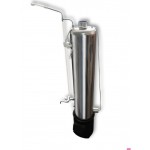
How to Choose a Household Autoclave
How to choose a household autoclave that is of high quality, meets your needs, and is reasonably priced? This is a relevant question for potential buyers of home canning devices. With hundreds available on the market, it can be challenging to navigate all the types and materials.
Types and Materials as Selection Criteria
All autoclaves consist of a large loading chamber and a special lid with sealing. The lid features a check valve, pressure release safety valve, pressure gauge, and thermometer.
Canning devices are made from:
- Stainless steel. A more expensive option but durable. Resistant to wear and can last up to 50 years with proper care. Can be converted into a moonshine still. Rust formation is excluded. The steel is food-grade and safe. Can accommodate jars of various sizes.
- Carbon steel. A cheaper but less durable material. Prone to corrosion and cannot be used for extended periods. Different-sized jars can be used at the same time.
Both options are equally suitable for canning meat, fish, mushrooms, vegetables, and fruits. The canned food comes out delicious and nutritious, as autoclaving destroys viruses and bacteria, but the beneficial nutrients remain in the food.
Any autoclave requires time to heat up. For canning, the device needs to reach a temperature of 110°C, which typically takes an hour or more. The rest of the time (about half an hour) is required for the actual canning process. During the entire period, a heat source is necessary. This could be a gas stove, open flame, or electricity. Based on this criterion, there are 2 types of household autoclaves.
There are 2 types of household autoclaves:
- Gas-powered. Suitable for use on a stove or wood burner. They perform their main function well but are not very convenient to operate. The unit, along with its contents, must be lifted onto a gas stove and later removed.
- Electric. A more convenient option, though more expensive. For heating, you only need to place the autoclave near an outlet. These devices also come with an electric temperature regulator, which almost eliminates the need for human involvement in the canning process. If necessary, the electric device can also be used on a stove.
What to Consider When Choosing a Household Autoclave
Guidelines for choosing a household autoclave:
| Parameter | Characteristic |
|---|---|
| Weight | The heaviest autoclaves are made of carbon steel, gas-powered. Stainless steel models are lighter. |
| Capacity | All autoclaves have varying capacities, from 8 to 40 or more jars. Choose the option that suits your desired volume. While preparing 40 jars of jam at once is convenient, such devices are expensive and hard to justify. |
| Price | The prices of autoclaves depend on the type, material, and capacity. The cheapest options are carbon steel, gas-powered, and hold 8 jars. Stainless steel devices are significantly more expensive. |
| Ability to Accommodate Different-Sized Jars | Some autoclaves allow you to place different-sized jars simultaneously. This is convenient since you may not always have identical containers at home. |
| Manufacturer | It's important to choose a reputable manufacturer that tests and inspects its products before shipping. This ensures safe operation. It's good if the store provides a warranty, and the product comes with accessories, instructions, and certification. |
| Technical Specifications | Wall thickness, dimensions, and other technical aspects are also important. Pay attention to the height of the autoclave to see if it will fit on your gas stove and if it will be convenient to use. Check the diameter of the device to see if a 3-liter jar will fit inside. |
| Completeness | Does it come with a thermometer, pressure gauge, safety valve, nipple, etc.? |
In our online store, household autoclaves of various types, materials, and sizes are available for order. All devices are of high quality, come with a 1-5 year warranty, and are safe for use. To ensure you make the right choice, consult with our specialists.
Read also:
- Autoclave Operating Modes
- What is an Autoclave
- Autoclave Hydraulic Tests
- How to Use an Autoclave
- How to Choose an Autoclave









